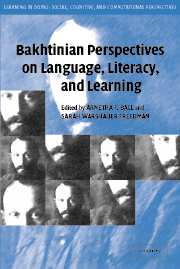Book contents
- Frontmatter
- Contents
- List of Contributors
- Acknowledgments
- PART I IDEOLOGIES IN DIALOGUE: THEORETICAL CONSIDERATIONS
- 1 Ideological Becoming: Bakhtinian Concepts to Guide the Study of Language, Literacy, and Learning
- 2 Dewey and Bakhtin in Dialogue: From Rosenblatt to a Pedagogy of Literature as Social, Aesthetic Practice
- 3 Intertextualities: Volosinov, Bakhtin, Literary Theory, and Literacy Studies
- 4 The Teaching of Academic Language to Minority Second Language Learners
- Voices in Dialogue – Dialoguing About Dialogism: Form and Content in a Bakhtinian Dialogue
- PART II VOICED, DOUBLE VOICED, AND MULTIVOICED DISCOURSES IN OUR SCHOOLS
- PART III HETEROGLOSSIA IN A CHANGING WORLD
- PART IV A CLOSING THOUGHT ON BAKHTINIAN PERSPECTIVES
- Author Index
- Subject Index
- Titles in the series
- References
4 - The Teaching of Academic Language to Minority Second Language Learners
Published online by Cambridge University Press: 24 May 2010
- Frontmatter
- Contents
- List of Contributors
- Acknowledgments
- PART I IDEOLOGIES IN DIALOGUE: THEORETICAL CONSIDERATIONS
- 1 Ideological Becoming: Bakhtinian Concepts to Guide the Study of Language, Literacy, and Learning
- 2 Dewey and Bakhtin in Dialogue: From Rosenblatt to a Pedagogy of Literature as Social, Aesthetic Practice
- 3 Intertextualities: Volosinov, Bakhtin, Literary Theory, and Literacy Studies
- 4 The Teaching of Academic Language to Minority Second Language Learners
- Voices in Dialogue – Dialoguing About Dialogism: Form and Content in a Bakhtinian Dialogue
- PART II VOICED, DOUBLE VOICED, AND MULTIVOICED DISCOURSES IN OUR SCHOOLS
- PART III HETEROGLOSSIA IN A CHANGING WORLD
- PART IV A CLOSING THOUGHT ON BAKHTINIAN PERSPECTIVES
- Author Index
- Subject Index
- Titles in the series
- References
Summary
Within the last several years, individuals working with English language learners have focused increasingly on the development of the types of language proficiencies that are required to perform successfully in academic contexts. Most practitioners and researchers agree that, in order to succeed in American schools, such learners must be given the opportunity to acquire academic, rather than everyday, language.
Unfortunately, in spite of the growing interest in the kind of language that will result in school success, we currently lack a single definition or even general agreement about what is meant by academic language. Although this has been discouraging and problematic for a number of practitioners, what is significant is that many more groups and individuals are now engaging in the examination of what they understand to be academic language and inquiring about its role in the school success of language-minority children. It is my position that it is both useful and productive to try to unravel and examine what different individuals mean by the various terms used to refer to academic language and particularly to understand the dialogic nature of the discussion itself – a discussion held at professional meetings, at conferences, in articles published in journals, and in entire books written by scholars as they consciously or unconsciously respond to other voices in the dialogue. These voices include those heard through the popular media, those of political activists of various types and backgrounds, and those of everyday citizens who want to inform themselves before voting on now-popular propositions that directly focus on language.
Information
- Type
- Chapter
- Information
- Publisher: Cambridge University PressPrint publication year: 2004
References
Accessibility standard: Unknown
Why this information is here
This section outlines the accessibility features of this content - including support for screen readers, full keyboard navigation and high-contrast display options. This may not be relevant for you.Accessibility Information
- 17
- Cited by
